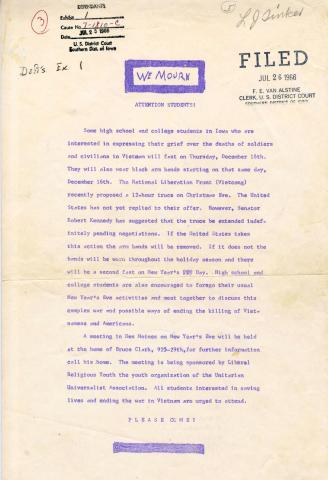
Description
This document was entered as defendants' Exhibit 1 in John F. Tinker et. al. v. The Des Moines Independent Community School District et. al. It describes plans for a peaceful protest against the Vietnam War involving fasting and the wearing of armbands. A group of Des Moines, Iowa, adults and students met in December 1965 to plan a public protest against the Vietnam War. A group of junior high and high school students decided to wear black armbands from December 16 until New Year's Day to peacefully express their "grief over the deaths of soldiers and civilians in Vietnam. The students planned to put this notice in the Roosevelt High School newspaper inviting other students to join the effort. However, the editorial was censored by the high school and was instead shared with local media.
On December 14, Des Moines School District principals met and enacted a rule that "any student wearing an arm band would be asked to remove the arm band, and if he refused he would be suspended until he returned without the arm band." The policy was announced to all students on December 15, as well as reported in The Des Moines Register. Students Mary Beth Tinker, John Tinker, Christopher Eckhardt and two others were suspended after refusing to remove their black armbands when they arrived at school on December 16 and 17. About a dozen other students also wore armbands. Upon their suspensions, the Tinkers and Eckhardt refused to return to school until after New Year's Day – the intended period for wearing the armbands. With assistance from the American Civil Liberties Union (ACLU), the Tinker and Eckhardt families filed a complaint against the school district for violation of the right to free speech under the First Amendment, and further that First Amendment rights are protected from state infringement (such as a public school board) under the due process clause in the Fourteenth Amendment.
Source-Dependent Questions
- According to the document, what was the intention of the armbands? How did this differ from the characterization of this as a protest in the source description?
- How did students forgoing their "usual New Year’s Eve activities" add legitimacy to their actions? How did this garner support for their cause?
- Consider the historical context of the actions by the Tinkers and Reverend Gwendolyn Webb. How were both teenagers attempting to sway public opinion through similar actions? Why was there more tension related to the protests in the South? Why was more drastic action taken by Reverend Webb than the Tinkers?
Citation Information
"Protest Plans for Des Moines Students," John F. Tinker et. al. v. The Des Moines Independent Community School District et. al., December 1965. Courtesy of National Archives